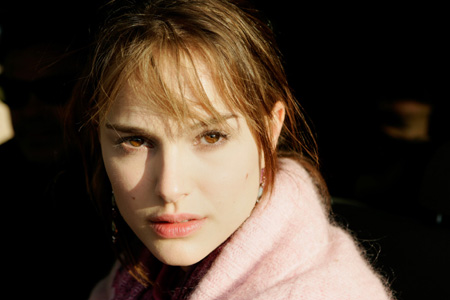|
Reviews of Recent Independent, Foreign, & Documentary Films in Theaters and DVD/Home Video
Directed by: Amos Gitai. Produced by: Nicolas Blanc, Michael Tapuach & Laurent Truchot. Written by: Amos Gitai & Marie José Sanselme. Director of Photography: Laurent Brunet. Edited by: Isabelle Ingold & Yann Dedet. Released by: New Yorker. Language: English, Hebrew & Arabic with English subtitles. Country of Origin: France, Israel, Spain & Belgium. 90 min. Not Rated. With: Natalie Portman, Hanna Laslo, Hiam Abbass & Carmen Maura. Not since Nicole Kidman in Birth has an actress been more scrutinized and adored by a director’s lens. With the Wailing Wall in the background, Free Zone’s opening shot continues for at least seven minutes, focusing in an extreme close-up on star Natalie Portman breaking down in a parked car. The scene is overlaid with the apocalyptic traditional ballad “Had Gadia,” which includes the lyric, “How long will this circle of horror last?” There’s no deciphering required here or elsewhere in director Amos Gitai’s exploration of the Middle East. After Rebecca (Portman) composes herself, she capriciously accompanies her driver, the tough-as-nails Israeli Hannah (Hannah Laszlo), on a family business matter in Jordan; the American has no where else to go. In an almost hallucinogenic effect, the journey through Jordanian villages is overlapped with Rebecca’s nighttime arrival into Israel with her boyfriend and his disapproving Spanish mother, all chauffeured by Hannah. Gitai disorients the viewer, much like Rebecca who was expecting a more romanticized vision of camels, hookahs and sand dunes. (Rebecca’s breaking up with her beau – revealed in another flashback-cum-overlap - is the cause of her crying jag.) Their journey is history made easy. It’s hard not to get caught up in Rebecca’s enthusiasm as she recites historical data to the distracted Hannah, who has other things on her mind. A day earlier, her husband was injured in an attack on his auto garage. It’s understood that this was part of the Intifada, though it’s slightly incredulous that Hannah would chauffer tourists while her husband is recuperating. But money is another matter. Hannah’s driving to the free zone – a trading area in Eastern Jordan without taxes and customs - to get $30,000 owed to her husband by a mystery man, known as the American. The characters may be squeezed into the setup, but you would never know it by the agile performances. Laszlo clearly merited her win as best actress at last year’s Cannes. And judging from her heartfelt turn as Rebecca, Portman seems much more at home in character-driven, art house fare than her usual studio extravaganzas. In a road trip fraught with tension, Rebecca and Hannah are relentlessly interrogated by Israeli border security. Once Hannah finally finds a gas station, Rebecca impulsively takes tea with the Palestinian gas station owner, ignoring Hannah’s admonitions, which turn out to be unfounded. And when Hannah arrives to her destination in the free zone, Leila (Hiam Abbass), a Palestinian woman roughly the same age as her, is closing shop. The American is no where in sight and Leila insists she doesn’t have the cash. The tension in Free Zone is tame compared to the suicide bomber drama Paradise Now (which also featured Abbass) or in Private, where a Palestinian family’s home is taken over by the Israeli army. Yet the seething anger, if not hatred, is laid bare in the nearly lethal exchanges between Hannah and Leila, which is only ostensibly about money. Though violence-free, Free Zone is as ominous as the two previously mentioned films. If these maternal figures can’t come to an agreement, who can? As a dramatization of the Mid-East logjam, Free Zone doesn’t lay bare any new layers to the conundrum. Echoing the region's politics, Hannah and Leila are as intractable upon their first meeting as they are at the end. (One common bond all three women will share, pop music, is only temporary.) But refreshingly direct and metaphor-lite, Free Zone is absorbing, even when dialogue becomes speech-making and not conversation or debate.
Kent Turner
|

